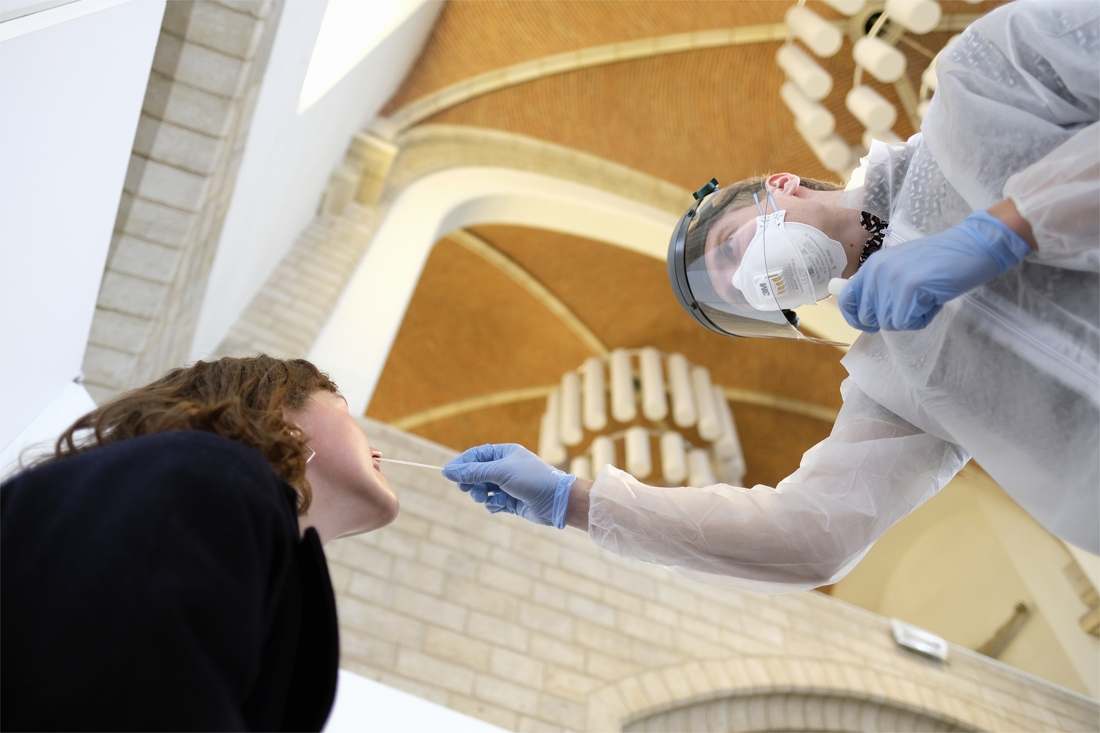The decision to stop testing asymptomatic individuals is necessary to give labs the opportunity to devote their capacity to other priorities. Professor Herman Goossens (UAntwerp), who was recently appointed as coordinator of a task force for corona tests, said this to Radio 1 on Tuesday morning. Infectiologist Steven Callens (UZ Gent) warns that this approach involves risks: “We are giving up our only defense wall, and take the risk that the whole house of cards will soon collapse. ”
–
“At the end of last week, we received alarming reports that the labs could no longer follow up and that there were enormous waiting times,” says Goossens. “That is a problem because we study many asymptomatic people. About half of all tests, while in the Netherlands, for example, that is only ten percent of the total number of tests. In addition, an important manufacturer was no longer able to supply sufficient test kits. Corona Commissioner Pedro Facon has therefore drawn up a memorandum this weekend, which was approved by the government on Monday, in which it was decided to free up capacity for people who do have to show symptoms. That must be the priority, right? “
Other priorities
The Belgian testing capacity is therefore shifting towards symptomatic people, residential care centers and health workers. “We are not unique in that area, many other countries are too. That asymptomatic people are more dangerous? That’s right, but our first priority should be to know if someone with complaints has Covid-19. A second priority is the clusters: whether an outbreak occurs in residential care centers, but also in education or at certain companies. And a third priority is the preventive screening of certain target groups, such as healthcare personnel. So that we can make hospitals and residential care centers a safe environment. ”
However, this second wave of corona infections was predicted. How is it then that no more testing capacity was provided? “Look, we are already a country where a lot of testing is done. In that respect, we are top three in Europe: we carry out 60,000 to 70,000 tests per day, in the Netherlands there are currently 40,000. So in terms of numbers we are doing very well, and there will be a lot more to come. We also work on this day and night. But all that personnel and equipment: you cannot supply that in a few weeks. I’m not going to speak out about the past, Corona Commissioner Pedro Facon asked me last week to coordinate our testing strategy, and I’m going to do that. ”
Tests for sports and culture sector
Goossens therefore acknowledges that as a result, there are “two to four difficult weeks ahead” in the fight against the pandemic, especially in terms of tests. “We must indeed reduce for a while. I therefore think it is not possible that we now spend our capacity on, for example, the culture or sports sector. We shouldn’t use our tests for that now, the priority should now go to public health. ” The logical conclusion would then be that the cultural sector should close its doors temporarily, and that sports competitions should be temporarily halted. But Goossens did not want to go that far. “I didn’t say that”, it sounded.
According to Flemish Minister of Sport Ben Weyts (N-VA), however, it is not necessary to stop the tests for the sports sector. “I understand that it really pains us that we spend tests on that, and that that could be a symbolic decision. But it’s not about the big numbers now either, is it? Only a few professional competitions that are obliged to do so by the government. In that perspective, that doesn’t seem like the biggest problem.
Callens: “We take the risk that the whole house of cards will collapse”
Infectiologist Steven Callens (UZ Gent) also has questions about the new test strategy. “Until yesterday, the strategy was ‘test and trace’. That way we could stop the spread of the virus, that was important. But if we stop tracing all potentially infected people, the virus will spread. That we give up the first defense wall? Not just the first, but the defensive wall. ”
It was also decided to adjust the duration of the mandatory quarantine from 7 to 10 days. “Those ten days are indeed enough: after that period very few people who have been in contact with an infected person become positive. But without tests, monitoring who should actually be quarantined becomes a problem. See, if you adjust the test strategy, you also have to dare to take the accompanying measures. Ireland, for example, is going back into lockdown completely, that will probably have its reasons. But we take one card from the house of cards. Then you take the risk that the whole house will collapse. ”
– .


